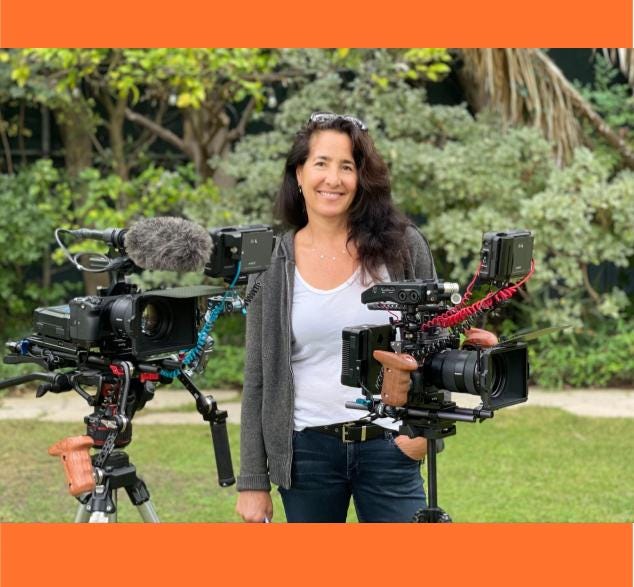You've Only Got One Death to LiveSerene Meshel-Dillman Turned a Doc Series About Dying Into a Streaming Sensation“I’m trying to die correctly,” said the writer Lawrence Durrell, “but it’s very difficult, you know.” In a culture that would rather the subject never came up, having a good death is often impossible. Documentarian Serene Meshel-Dillman is trying to change that with her documentary series, Take Me Out Feet First. The show is a hit on Prime, but don’t expect the usual binge. It’s a frank and moving depiction of dying. Made in partnership with the organization Compassion & Choices, the series follows patients with terminal illnesses who decide to end their lives through Medical Aid in Dying, or MAID. MAID is not euthanasia, but a practice in which a competent, terminally sick adult requests a lethal prescription from a physician, which they may use to end their life (many such patients never take the drugs). It’s legal in the District of Columbia and 10 states (California, Colorado, Hawaii, Maine, Montana, New Jersey, New Mexico, Oregon, Vermont, and Washington), but remains the subject of intense ethical debate. For Meshel-Dillman, whose previous work includes Getting to The Nutcracker and The 5th Dementia, the subject is personal: Her parents Miriam and Robert Meshel both chose MAID. That experience led the documentarian and her husband, filmmaker Ray Dillman, to travel the country, interviewing 25 individuals who took similar steps. “There is a lot of misinformation about the subject,” says Meshel-Dillman. “Hopefully, the series and the people in the episodes are helping to educate in that regard. This series is part of their legacies—their last wish for everyone to see.” Meshel-Dillman hopes the series will nudge more states into legalizing MAID. But if the political process is fraught, the show sheds light on a critical aspect of life that’s mostly kept hidden. In the Wag Interview, she discusses how important it is to bring dying into the light. “Having the opportunity to be present when your loved one is dying is a gift,” she says. “There is warmth, understanding, love, and quite a bit of joking around. I hope I can leave this earth that way. Yes, there is sadness. The person you love will no longer be here. But knowing they’ve had the choice to avoid pain and suffering and being witness to that is pretty f—ing special.” CultureWag: Your mother and father come across as incredibly brave and thoughtful. How did their experiences influence your decision to make this film? Serene Meshel-Dillman: My mother and father opted to use medical aid in dying five years apart. The idea to do the series was both my father’s and mine. My mother and I were not close for most of my life. My dad was always running interference and desperately tried on numerous occasions to broker the peace. I believe my mother put a lot of her sadness about our relationship on him and he had to live with her so he was always trying to make it better. After she passed, he asked me to follow through on the idea I’d had while filming her the night before she took the medicine to pass away using MAID. My mother and I had spent about five hours together talking late into the night. We ended up in a really nice place of understanding, acceptance, and love. I filmed most of what we discussed— when my camera did not turn itself off from overheating. I put the footage away and didn’t think about what I’d do with it for a couple of years. My dad ultimately asked me to make the film as a tribute to her. He thought I’d see more in my mother to love by going back through our lives. Through an odd series of coincidences, I ended up working with Compassion & Choices which is an organization that supports MAID legislation nationwide. My husband, Ray, was the cinematographer and editor. We ended up traveling to various states for about two years interviewing terminally ill people who were advocates for MAID through C &C. They wanted to share their stories about why they were opting to use MAID or why they were angry that they didn’t have the choice. About five years after my mom passed, my father also opted to use MAID when he was diagnosed with terminal cancer. I filmed his journey as well. To his immense credit, he was generous enough to allow me to cover every minute of the end of his life. This was much, much harder for me. Throughout my life, my dad was my person. He was completely on board with everything I did to tell his story. My mother and father’s story became the pilot episode in Season One of Take Me Out Feet First. CW: The public has a poor understanding of end-of-life issues. Are you seeing a shift in attitudes as people see the series? SMD: Compassion & Choices have a lot of data they compile about medical aid in dying every year, from states where it’s legal as well as from states where they help try to get legislation for MAID passed. Some of the statistics are startling. For example, in states where it is legal, only one percent of people who die use MAID. When a patient requests the medicine for MAID, one-third do not use the medication. The relief they get from knowing they have an out is enough. A lot of times, the patient lives longer because of the peace they feel from having the medication just in case they decide to use it. I get emails, DM’s, and texts almost every day from people who have watched the series thanking me for shedding light on the subject. Most people have no idea what MAID is, what the guardrails are that prevent any kind of abuse of the process, and where it is available. I have friends in California who still have no idea it is legal here. Even in states where MAID is legal, some doctors of terminally ill patients do not advise about the choice for MAID. There is a lot of misinformation about the subject. I had a friend watch an early screening of the “Mimi” episode [the third episode of the series] and her comment stuck with me. She said: “Mimi spent her last two days of life with us. We better sit up and listen.” I thought that was such an insightful takeaway. I believe the process of changing minds will be slow but steady. Ray wanted me to share the story of his Aunt Jayne. She lives in Georgia. She had a long career as a nurse, is a staunch Republican, and was against the concept of medical aid in dying. Jayne knew both of my parents. She called me after watching the first episode and said, “You’ve changed my mind.” So yeah, I think it’s possible. CW: The stars of your series are engaging and wise. They're also dying. You and your husband witnessed their last days. As a filmmaker, how did it feel to share that kind of intimacy with your subjects? How did it feel to say goodbye, over and over again?... Continue reading this post for free in the Substack app |




